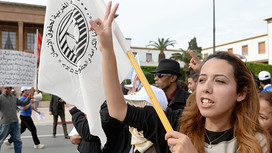Financial Times

Members of the Moroccan Human Rights Association (AMDH) shout slogans during a demonstration outside the parliament building in Rabat
The 100 or so activists gather in front of the Moroccan parliament at dusk. They chant slogans demanding freedom and greater civil liberties in a scene that would be unimaginable in almost any other Arab country.
“We have a kind of a freedom,” says Mohammed Rachid el-Mouewouine, an environment ministry employee attending the small rally. “We can have a demonstration like this. We can express ourselves.”
But many worry such modest freedoms, won by civil society and human rights activists in fits and starts over the years, are being eroded as the country’s security forces use the threat of rising regional instability and the resurgence of jihadi groups like theIslamic State of Iraq and the Levant, or Isis, to restrict the country’s political space.
“Though . . . the group has no real presence here, the Moroccan government has used the Isis issue repeatedly,” says one analyst at an international organisation. “The government has made multiple arrests of recruitment networks, but there is no sign of any armed group on the ground connected to Isis.”
Activists lament growing public apathy about democratic reform, triggered in large part by the rise of Isis and the regional conflicts that populate television news broadcasts. Over 2,000 Moroccan men are believed to have joined Isis, along with hundreds more fighters of Moroccan descent residing in Europe.
“Morocco now is the good example compared to Syria or Libya or the whole region,” says Khadija Riadi, a member of the Moroccan Association for Human Rights, known by its French initials, AMDH. “The regime is using this card not to respect human rights or democratic aspirations.”
Unlike the regimes in Egypt, Libya, Tunisia and Syria, Morocco’s centuries-old monarchy permitted mass protests by a coalition calling itself the February 20 movement after 2011 revolutions in Egypt and Tunisia. Afterwards, King Mohammed VI committed himself to constitutional reform that eventually led to fresh parliamentary elections and a government led by moderate Islamists.
But hopes that Morocco would continue on a reformist course have been curtailed amid the rise of regional instability and the resurgent threat of jihadi groups, including affiliates and adherents of Isis, which have surfaced throughout north Africa.
Defenders of Morocco’s system say that since 2011 there has been a genuine effort to implement the new constitution and progress has been made on reform, but add that the public mood in general favours stability over democracy.
“You have a Middle East that’s not doing very well,” said Karim Aynaoui, managing director of the government-owned OPC think-tank. “The crazy barbarians appear on the surface. There is no progress in the conflict between Israel and Palestine. Syria is not resolved. Libya is in chaos. All that makes you thankful for the stability you have.”
A similar dynamic may be in motion in Jordan, sandwiched between wars and unrest in Syria, Iraq, Lebanon and Israel. The country’s monarchy, once praised for allowing a relatively vibrant political culture, has clamped down on dissent, arresting the deputy leader of the Muslim Brotherhood this month and ending an eight-year moratorium on the death penalty by hanging 11 men convicted of murder.
Morocco’s justice system has also come under scrutiny as dozens of civilians have been hauled before military tribunals, despite a constitutional ban. Promises of press freedom have gone unfulfilled.
“The Moroccan government’s promised campaign to expand press freedom languished in 2013, as proposed reform legislation failed to be finalised over the course of the year,” says a report issued by Freedom House, a Washington-based advocacy group. “Unofficial but clear restrictions remained in place, discouraging coverage of politically and socially sensitive subjects, while restrictive laws continued to be used to clamp down on journalists and news sources.”
Activists in Morocco say that on the country’s most critical issues, the space for public debate has become more constricted. Debate over the country’s costly annexation of Western Sahara, which the UN refuses to recognise and is at the root of the decades-long dispute with neighbouring oil giant Algeria, remains a red line.
“The king recently issued an ultimatum: if you don’t believe Western Sahara is Moroccan, you’re not Moroccan,” says Brahim Ansari, a Rabat-based researcher for Human Rights Watch. “They feel like they can do that because there’s no fierce or strong opposition.”
AMDH remains a primary target of the security forces. Activists affiliated with he group recount tense encounters with journalists close to the “mokhzen” or crown who have warned them to keep silent. “They accuse us of embezzling money from NGOs and receiving the support of Algeria and the Polisario [the Sahrawi militant group fighting for independence]”, says Ms Riadi.
Twitter: @borzou






